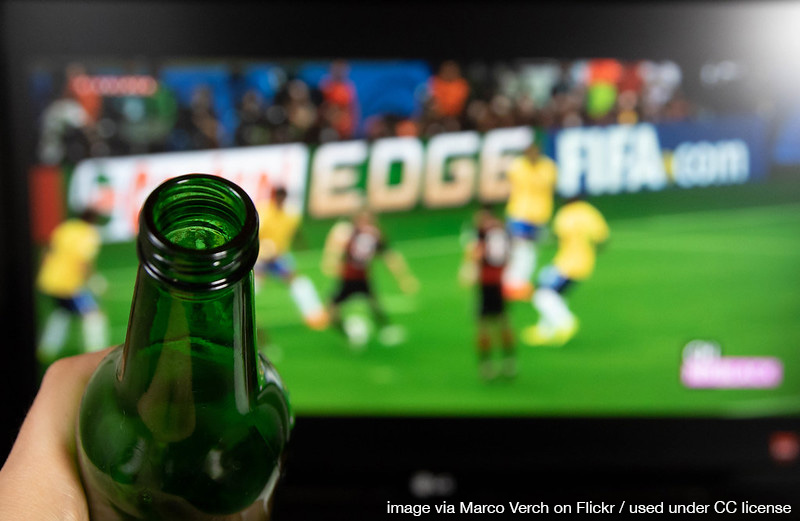
This November’s World Cup tournament features an unusual wrinkle–attendees risk jail time for enjoying one of its most prominent sponsor’s products. Because Qatar, the event’s host country, follows Islamic prohibition against alcohol,
anyone partaking of sponsor Budweiser’s signature products risks up to six months in prison, according to the
New York Daily News.
But as Big Alcohol has done time after time, Budweiser has wrenched Qatari law to fill its own pockets. The World Cup events will have “fan zones” set aside from alcohol consumption. This exemption is not new. Writing for Defector,
Charles Pierce reminisces about the 1993 World Cup qualifiers in Qatar:
[Foreign contracting] required Qatar to make some allowance for the Americans who came to town to work the oilfields. … In this case, as in so many others, expedience trumped religious doctrine.
And that plays into the real horror of Budweiser’s engagement. Qatar’s reliance on migrant labor for its construction projects is well-recognized. The enormous scope of the World Cup facility and attendant infrastructure may
cost Qatar upwards of $220 billion. This far-reaching campaign has been underwritten in no small part by its sponsors, including Adidas, Coca-Cola… and Annheuser-Busch InBev, the owner of Budweiser.
That money has gone into
a development scheme that, according to Guardian estimates, cost 6,500 lives. According to an Amnesty International report,
the businesses practices that Budweiser helped pay for have been egregious: South Asian laborers from Bangladesh, India, and Nepal asked to take on $500 to $4000 in debt for the “recruitment fees,” then shipped to Qatar with the debt still standing. On arrival, the laborers’ passports were confiscated.
The conditions of essentially indenture were just the beginning. Salaries were substantially less than promised. Payments were delayed. Residence permits were allowed to expire, making laborers at risk of jail if they leave the work camp. Living conditions are cramped–eight or more to a room–and work conditions dangerous; the Guardian reports that heat death was also a persistent risk for laborers.
Budweiser has been involved in World Cup sponsorship for over a decade. While the terms of their contract are not public, estimates have them paying between $130 and $325 million during the lead-up, with a data-mining-heavy ad campaign launched at the end of 2022. This steady involvement even as the details of tragedy mount has not gone unnoticed. In September,
Human Rights Watch called for a sponsor pressure campaign towards the Qatari government. In a culture-jamming campaign aimed at the World Cup sponsors,
an activist graphic designer augmented the Budweiser (the King of Beers) logo with the slogan “you can’t be the kind without slaves.”
AB InBev has acknowledged the situation in Qatar, agreeing to join Human Rights Watch’s call for better compensation for migrant workers and issuing–
at the very end of a March 2022 press release–a statement of support for the laborers. Yet, at the same time, they have not acknowledged the stories of widespread abuse and mortality detailed by Amnesty International and the
Guardian.
They did, however, launch an ambitious, multiplatform World Cup ad campaign themed–and no, we’re not making this up–“The World Is Yours to Take.”
Alcohol Justice has long raised the call to Free Our Sports. Yet this is an instance where the conjunction of sports, alcohol, and money lead to underwriting violations of human liberty that shock the conscience. In its ceaseless, remorseless campaign to get its product in front of sports fans (including underage ones) across the world, Budweiser has fed a brutal labor machine that will stain soccer for decades. There won’t be a trace of red on Budweiser’s balance sheets, though.
READ MORE about Free Our Sports.
READ MORE about AB InBev’s cynicism in the face of tragedy.
 en
en